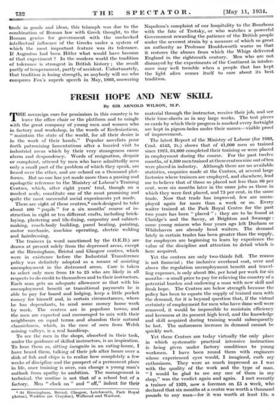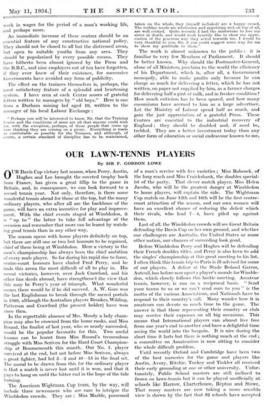FRESH HOPE AND NEW SKILL
By SIR ARNOLD WILSON, M.P.
THE sovereign cure for pessimism in this country is to leave the office chair or the platform and to mingle with the great company of young men and women who in factory and workshop, in the words of Ecelesiasticus, " maintain the state of the world, for all their desire is in the work of their hands." Popular novelists pour forth patronizing lamentations after a hurried visit to industrial areas which by their very strangeness cause alarm and despondency. Words of resignation, despair or complaint, uttered by men who have admittedly seen only a small part of the problem of which they speak, are heard over the ether, and are echoed on a thousand plat- forms. But no one has yet made more than a passing and apologetic reference to the Ministry of Labour's Training Centres, which, after eight years' trial, though on a modest scale, constitute one of the most promising and quite the most successful social experiments yet made.
There are eight of these centres,* each designed to take about 400 " pupils " for a six months' course of in- struction in eight or ten different crafts, including brick- laying, plastering and tile-fixing, carpentry and cabinet- making, coach-body building, panel beating, painting, motor mechanic, machine operating, electric welding and hairdressing.
The trainees (a word sanctioned by the O.E.D.) are drawn at present solely from the depressed areas, except at the Birmingham, Bristol and Glasgow centres, which were in existence before the Industrial Transference policy was definitely adopted as a means of assisting unemployment in the distressed areas. Care is taken to select only men from 18 to 25 who are likely in all respects to do credit to themselves and to their instructors. Each man gets an adequate allowance so that with his unemployment benefit or transitional payments he is able to pay for board and lodging, keep a little pocket money for himself and, in certain circumstances, where he has dependants, to send some money home week by week. The centres are in populous towns, and the men are expected and encouraged to mix with their neighbours on equal terms., and abandon their natural clannishness, which, in the case of men from Welsh mining valleys, is a real handicap.
To see the men in the shops, absorbed in their task, under the guidance of skilled instructors, is an inspiration. To hear them as, sitting incognito in an eating-house, I have heard them, talking of their job after hours over a dish of fish and chips is to realize how completely a few weeks of discipline and the prospect of a permanent place in life, once training is over, can change a young man's outlook from apathy to ambition. The management is technical, the routine is not that of a school but of a factory. Men " clock on " and " off," indent for their
* At Birmingham, Bristol, Glasgow, Letchworth, Park Royal (Acton), Waddon (nr. Croydon), Wallsend and Watford.
material through the instructor, receive their job, and see their time-sheets as in any large works. The test pieces or cards by which their progress is marked every fortnight are kept in pigeon-holes under their names—visible proof of improvement.
The latest Report of the Ministry of Labour (for 1983, Cmd. 4543, 2s.) shows that of 41,000 men so trained since 1925, 34,000 completed their training or were placed in employment during the course. For the past twelve months, of 4,500 men trained at these centres nine out of ten were placed in industry. Although there are no available statistics, enquiries made at the Centres, at several large factories where trainees are employed, and elsewhere, lead me to believe that of those so placed not less than 60 per cent. were six months later in the same jobs as those in which they were first placed, and 75 per cent. in the same trade. Now that trade has improved, few are unem- ployed again for more than a week or so. Every waiter trained at the Park Royal Centre for the past two years has been " placed " : they are to be found at Claridge's and the Savoy, at Brighton and Swanage : some young miners who four years ago left Durham or Whitehaven are already head waiters. The demand lately in certain trades has been greater than the supply, for employers are beginning to learn by experience the value of the discipline and attention to detail which is here acquired.
Yet the centres are only two-thirds full. The reason is not financial ; the inclusive overhead cost, over and above the regulation unemployment benefit and travel- ling expenses, is only about 30s. per head per week for six months—a small price to pay for relieving the country of a potential burden and endowing a man with new skill and fresh hope. The Centres are below strength because the policy has been to equate the supply of trained men with the demand, for it is beyond question that, if the virtual certainty of employment for men who have done well were removed, it would be impossible to maintain efficiency and keenness at its present high level, and the knowledge and skill acquired during training would subsequently be lost. The unforeseen increase in demand cannot be quickly met.
Yet these Centres are today virtually the only place in which systematic practical intensive instruction is being given under factory conditions to young workmen. I have been round them with engineers whose experienced eyes would, I imagined, curb my enthusiasm. They were as much impressed as I was with the quality of the work and the type of man. " I would be glad to see any one of them in my shop," was the verdict again and again. I met recently a trainee of 1929, now a foreman on £5 a week, who declared that six months at a centre was worth a thousand pounds to any man—for it was worth at least 15s. a week in wages for the period of a man's working life, and perhaps more.
An immediate increase of these centres should be an essential feature of any constructive national policy. They should not be closed to all but the distressed areas, but open to suitable youths from any area. They should be popularized by every possible means. They have hitherto been almost ignored by the Press and the B.B.C., and nine employers out of ten have forgotten, if they ever knew of their existence, for successive Governments have avoided any form of publicity.
The effect on the trainees themselves is, perhaps, the most satisfactory feature of a splendid and heartening system. I have seen at each Centre scores of grateful letters written to managers by " old boys." Here is one from a Durham mining lad aged 19, written to the manager of his local Labour Exchange : " Perhaps you will be interested to know, Sir, that the Training Centre and the conditions of same are all that anyone could wish for, with the exception, perhaps, of those people that come up here thinking they are coming on a picnic. Everything is made as comfortable as possible for the Trainees, and although, of course, a certain standard of discipline has to be maintained,
taken on the whole, they (myself included) are a happy crowd. The midday meals are wholesome and appetising and, on top of all, are well cooked. Quite recently I had the misfortune to lose my sister in death, and would most heartily like to show my appre- ciation of the generous way they acted towards me. I would be very thankful to you, Sir, if you could suggest some way for me to show my gratitude to them."
The work is almost unknown to the public : it is familiar to very few Members of Parliament. It should be better known. Why should the Postmaster-General, alone of all Ministers, proclaim to the world the efficiency of his Department, which is, after all, a Government monopoly, able to make profits only because he can charge as much for delivering a letter, which he has not written, on paper not supplied by him, as a farmer charges for delivering half a pint of milk, and in fresher condition? How much criticism has he been spared, and how many encomiums have accrued to him as a large advertiser. Let the Ministry of Labour spend half as much, and gain the just appreciation of a grateful Press. These Centres are essential to the industrial recovery of England : they should be doubled and, if need be, trebled. They are a better inyestment today than any other form of education or social endeavour known to me.









































 Previous page
Previous page